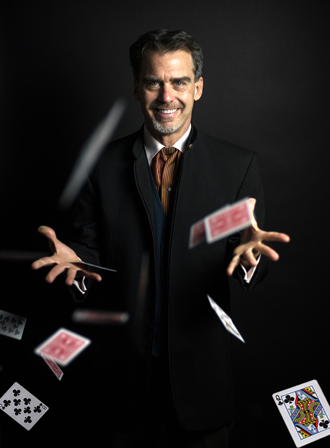
Ask most people what a "magic show" looks like, and whether they cite a backyard birthday party, Las Vegas casino lounge or a neighborhood tavern, they will usually agree that a magic show is exclusively tricks and illusions.
Imagine, then, the unexpected thrill at the 2000 premiere of House Theatre of Chicago's original biodrama Death and Harry Houdini where playgoers watched in stunned disbelief as actor Dennis Watkins, shackled in chains and padlocks, submerged himself in a tank of water to execute a fully-realized re-enactment of his persona's legendary "Water Torture" escape stunt. It didn't stop there, either. By 2015, stage-magic stunts had invaded the classics, with amazed subscribers at Chicago Shakespeare Theater, anticipating a straightforward production of The Tempest, witnessing feats of levitation, body-displacement and sleight-of-hand in evidence of Prospero's claim to have mastered wizardry in his exile.
Skip ahead to 2019, when Sean Masterson's solo show Timeless Magic recounts how a souvenir coin from Chicago's World Columbian Exhibition of 1893—bequeathed to him by a great-uncle claiming to have received it from one of the many world-famous magicians appearing thereat—launched the youthful legatee on a search for the identity of the original owner. Was it Harry Blackstone, Howard Thurston, the pseudonymous Chung Ling Soo? Was it Alexander Herrman or his widow, Adelaide Herrman, who carried on the act following his death? Could it have been Houdini himself? In order to ensure our awareness of the many possibilities, Masterson performs each contender's signature illusion before assessing the likelihood—or not—of its inventor being the source of the talisman.
Masterson confesses to a long fascination with the 1893 Exhibition—in particular, American magician William Ellsworth "Billy" Robinson. "The connections between [Robinson's] life trajectory and my own evolution as a magician inspired me to seek out opportunities for my repertoire to highlight the mystery surrounding his legacy. From a compositional point of view, searching for factual corroboration necessary to further the narrative is working backwards, but that's how it came about."
Masterson acknowledges that combining storytelling, stunts and performance can be, well, "tricky"—and not simply because few artists possess the multiple skills required to turn a slip of the wrist into a theatrical metaphor. "A magic trick is structured like a good knock-knock joke. It's amusing for spectators, and it's empowering for the perpetrator—but it can only sustain its suspense for a short time." The exception to this rule, he declares, was Harry Houdini, who "never went to theater school, but had an intuitive sense of narrative arc. He could open any lock in a matter of seconds, but he would orchestrate his performance for maximum dramatic effect, sometimes extending the process over several episodes."
The successful execution of a trick relies on audiences' attention being maneuvered away from the site of the deception, but though theatrical elements like music, dance or animals (real or artificial) can augment the distraction factor, they also require the magician to maintain control over more variables.
A mentalist stunt in Timeless Magic employs a larger-than-life puppet, identified as an aged ghost named Phineas Finch, who speaks in Shakespearean accents to volunteers commandeered from the audience. "Finch remains in control of the scene even when sharing the stage with strangers, thanks in part to his cheeky, but charming, delivery," explains Masterson. "This is important because, as his puppeteer, I'm almost completely hidden behind Finch, so I can't, in my capacity as a magician, address the audience directly." He grins mischievously, "On the other hand, no one expects a puppet to trick them."
So will we see more magic crossing over into other genres and venues? Masterson is reluctant to prognosticate, but notes the emergence in France of a "magie nouvelle" exploring the limits of conventional legerdemain. More significant, however, may be his observation of millennial-aged spectators at corporate events ignoring cocktails, dinner summons and network opportunities to instead cluster around the magicians hired to provide entertainment. Whether this behavior bespeaks their valuing experience over material goods or reflects extensive time spent in the two-dimensional digital world making the tactile world of magic more powerful, or springs from a shared familiarity with the Harry Potter myths, still remains unresolved—even for a magician.
Timeless Magic runs Wednesdays at the Chicago Magic Lounge through October 2.
Mary Shen Barnidge
Contributing Writer

 Follow Us On Twitter
Follow Us On Twitter